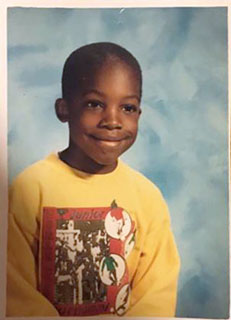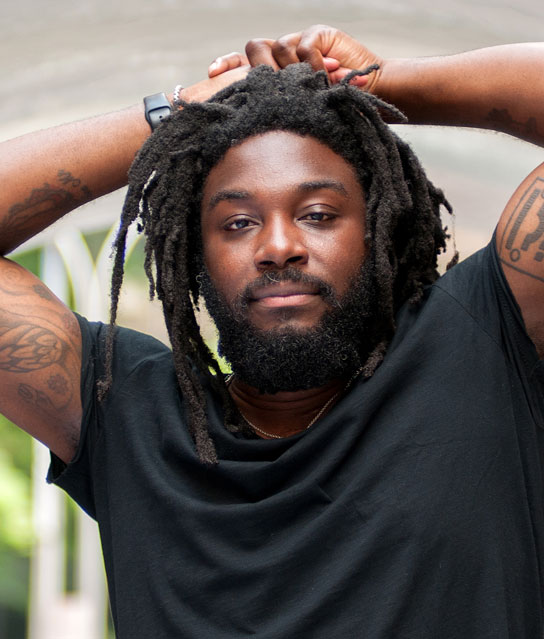INTERVIEW - December, 2018
Jason Reynolds ~ Life Ain’t Always No Happy Ending
Author Jason Reynolds talks about writing and life’s challenges (and writing about life’s challenges)
WRITERS: Kylar Flynn,Sammie Dostart-Meers, Eve Sloan, Lilah Richman, Eliza Gould, Jane Merkle, Kylie Sebastian (FROM: Marin Academy, Menlo School, St.Ignatius Preparatory, Davidson Middle, Marin Catholic and San Domenico Schools)
The novel Long Way Down, is written in verse. Taking place over a period of 60 seconds, it details the story of a teenage boy named Will whose brother has been murdered. As he rides an elevator to the ground floor, the site of the crime, he must decide whether to follow the rules of his neighborhood and avenge the murder using his brother’s gun.
The story jolted us. It made us feel. It made us think. It made us question.
“My job isn’t to give you any answer,” Reynolds said. “My job is to lead you all the way up to the point and challenge you to activate your critical-thinking skills and your imaginations. Then, you couple those with your empathy and your own experiences and that’s how you draw up a conclusion.
“Long Way Down is very close to my life and what I went through as a young person.”
In Reynolds’ The Boy in the Black Suit the main character must contend with the death of his mother, a detail mirroring Reynolds own experiences as a child—living through the deaths of many individuals close to him and attending many funerals.
“I think (Black Suit is) my favorite book because I experienced a lot of loss early in life,” Reynolds said. “My job is to present a story that’s going to cause you, the reader, to struggle. I want you to wrestle with it because life isn’t tied up in a bow. In real life, we have to wrestle with our every day. When you guys walk out of the house, you’ve got to wrestle with whatever the world has for you. When you get to school or when you’re hanging with your friends or whatever it is, you have to wrestle with those relationships. I try to present stories that are about the struggle of our lives. The struggle doesn’t always mean bad, because there are good things that happen in all these stories. There’s laughter, there’s friendships, there’s relationships, there’s jokes and all the other things that our lives are filled with. But we’re struggling.
“When I say struggling, I mean we’re struggling with ‘How do I laugh in times of pain? How do I deal with my pain when there’s so many other good things happening to my life?’ We’re always struggling with something, and that’s all I want my readers to do. I don’t want to teach you lessons. I’m not your teacher. I’m not your parent. I just want you to wrestle with the reality of all of our lives.”
For him, and indeed, for many others, life is no cakewalk. As soon as one steps out the door, one must grapple with the world and the challenges it presents.
Reynolds talked with us about another challenge—the reluctance in the world’s youth towards reading, an issue that is becoming increasingly widespread.
However, Reynolds doesn’t believe that people don’t like to read. Instead, he attributes this apparent aversion towards literature to simple boredom.
“Don’t nobody like to be bored, and I understand that,” he said. “So I would just challenge that person and say read the first five pages of Long Way Down or read the first five pages of Ghost or read the first five pages of When I Was the Greatest. All those books have instant hooks.”
This suggestion was derived from a college experience, in which he was told by a professor that he would fail out of school if he continued to not read. The professor then gave Reynolds a book called Black Boy; he was told to read the first five pages, and that if he didn’t enjoy it, he could stop.
On the second page, the main character sets fire to his mother’s house. Reynolds was hooked.
 Despite this experience, Reynolds did not foresee himself becoming an author.
Despite this experience, Reynolds did not foresee himself becoming an author.
“I grew up in a neighborhood where you had ball players, you had teachers, you had people who worked with the government, you had hustlers,” he said. “You didn’t know anybody who was an author.
“I was working in a clothing store in downtown Manhattan, New York City, selling clothes. And if I’d never made it, I’d probably still be in that clothing store selling clothes. ... I didn’t think this would happen to me, but I’m glad it did.”
Reynolds’ stories are deeply rooted in reality, and he is under no illusion that daily life is an easy endeavor. It seems, ultimately, that Reynolds, author extraordinaire, simply seeks to remind us that despite everything it holds, “Life ain’t ALWAYS no happy ending, but it’s always a great story.”
Want to be an author?
“The first thing you’ve got to do is to ask yourself a really hard question—do you want to be a writer or do you want to be famous?—because those two things are not the same. And we have to be clear about that, first and foremost.
You can be a writer. You can be an author. But that doesn’t guarantee you that you’re going to be famous. You’ve got to remember that. Ask yourself honestly what you want. If you want fame, then do something to make you famous.
The second thing is you’ve got to read and write. That sounds super simple but the hardest part about being a writer is writing. That’s the hard part. This is the easy part. I get to talk to you all, sign books, travel around, do all the fun stuff. But the hard part is me sitting at the computer every day and figuring out how to tell the story.
You see, the average person is lucky if they have one brilliant idea in the lifetime. The job of the author is to have hundreds of brilliant ideas over and over again.
And then, lastly, it’s about work. It’s about understanding that you’re always going to be insecure about everything you make. I am. Most of my friends are. We’re always going to be—it’s never going to be good enough and it’s always going to be difficult. And if you’re cool with those things, then I say jump in and make it happen. Because I promise you, on the other end of that rainbow, on the other end of that book when you finish it up, there is no greater feeling than to look at something you made, knowing how difficult it was, and say yo, this is mine. I did this. It’s a special, special thing, bro—a special thing.
And there ain’t no cheating. You can’t cheat being a writer. You can cheat being a photographer. You can cheat being a dancer, a painter, a musician. There’s so many ways to cheat. I can throw a filter on anything.
But when you’re writing a novel, when you’re a writer, there’s no cheating, there’s no cutting corners, there’s no skipping steps. One word after the next, one sentence after the next, one paragraph after the next, one page after the next, one chapter after the next.
That’s it.
